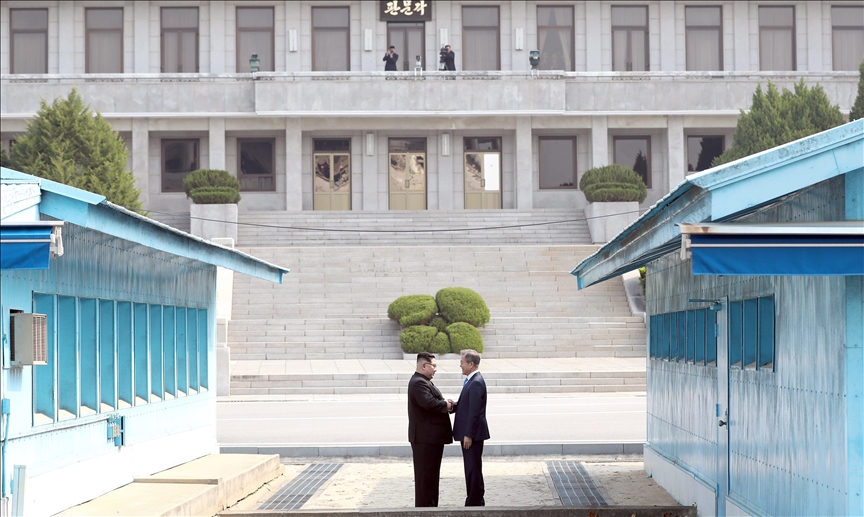Reunification with North fades from ideals of South Korea's younger generations, says expert
Despite decades of diplomacy, younger South Koreans increasingly indifferent to reunifying with the North -- viewing it as costly, distant, and irrelevant to their future
 North Korea's leader Kim Jong Un (L) shakes hands with South Korea's President Moon Jae-in (R) at the Military Demarcation Line that divides their countries ahead of their meeting at the official summit Peace House building at Panmunjom on April 27, 2018
North Korea's leader Kim Jong Un (L) shakes hands with South Korea's President Moon Jae-in (R) at the Military Demarcation Line that divides their countries ahead of their meeting at the official summit Peace House building at Panmunjom on April 27, 2018
ANKARA / ISTANBUL
Younger generations in South Korea are increasingly indifferent toward the idea of reunifying with the North, viewing it as economically burdensome and politically irrelevant to their future, experts told Anadolu.
The shift comes despite decades of political overtures and normalization efforts since the 1953 armistice ended active fighting in the Korean War.
This is the first part of Anadolu’s two-part special series: Hope for Reunification: Is a New Beginning Possible on the Korean Peninsula?
Following Japan’s defeat in World War II and the end of its colonial rule over Korea, the peninsula was divided between the US and Soviet spheres of influence.
In 1948, North Korea declared independence under Kim Il-sung, while South Korea, backed by Washington, was established as a republic.
The Korean War erupted in 1950 when the North invaded the South, leading to three years of intense conflict. The war ended in 1953 with an armistice agreement signed at Panmunjom, but no peace treaty followed, leaving the two Koreas technically still at war.
While some periods of detente have followed, including symbolic summits and trade cooperation, they have failed to produce a permanent peace or pathway to reunification.
South Korea’s President Lee Jae Myung, who took office earlier this year, has signaled interest in reviving dialogue.
“The strongest path to security is building a nation that will never need to fight -- by building peace,” Lee said in a public address.
Soon after, North Korea reportedly ceased its border propaganda broadcasts, prompting speculation about a potential thaw in relations.
-1970s marked 1st signs of rapprochement
Sarah Son, a senior lecturer in Korean Studies at the University of Sheffield, told Anadolu that the first meaningful attempt at reconciliation came in 1972, when both governments signed a joint communique under South Korean President Park Chung-hee.
The agreement pledged peaceful reunification and non-interference but ultimately collapsed due to mutual distrust.
- Post-military regime reforms
New diplomatic efforts emerged in the 1990s following South Korea’s transition to civilian rule.
A key milestone was the 1992 Basic Agreement -- formally known as the Agreement on Reconciliation, Non-Aggression, and Exchanges and Cooperation.
But progress stalled amid disputes over implementation and rising concerns over North Korea’s nuclear program.
- 'Sunshine Policy' era of engagement
Under President Kim Dae-jung, the 1998 launch of the “Sunshine Policy” marked a more ambitious push for reconciliation.
That initiative led to the first inter-Korean summit in 2000 between Kim and North Korean leader Kim Jong-il.
The period saw expanded economic cooperation and tourism, including the opening of North Korea’s Mount Kumgang to South Korean visitors.
“The Sunshine Policy also allowed families separated since the Korean War to reunite,” Son said.
But the policy’s momentum declined after 2008, as conservative administrations in Seoul shifted direction. Subsequent outreach efforts faced new challenges, including the COVID-19 pandemic and Pyongyang’s expanding weapons program.
- Reunification no longer a generational goal
Son said repeated disappointments have eroded public faith in reconciliation.
“South Koreans have been presented with hopeful visions of reconciliation many times, only to face disappointment,” she said.
Support for reunification, she added, now fluctuates and fades quickly.
“The younger generation no longer sees reunification as an ideal,” she said. “They don’t remember the Korean War. Their parents don’t either. It’s a fading ideal.”
Son said the costs of reunification -- especially modernizing North Korea’s economy and infrastructure -- also play a role in public disinterest.
“Bringing North Korea’s infrastructure up to South Korean standards would be extremely expensive,” she said. “It’s no longer seen as practical or desirable by much of the South Korean public.”
Anadolu Agency website contains only a portion of the news stories offered to subscribers in the AA News Broadcasting System (HAS), and in summarized form. Please contact us for subscription options.







